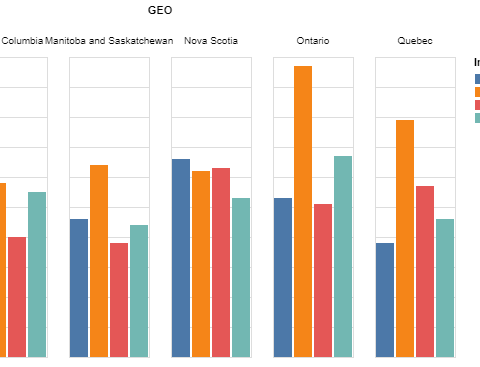 Controversy over Canada’s temporary foreign workers program – and perceptions that some employers are abusing it – made headlines earlier this year. U of T Magazine editor Scott Anderson asked Jeffrey Reitz, a sociology professor at the Munk School of Global Affairs who studies immigration, for his perspective on the debate.
Controversy over Canada’s temporary foreign workers program – and perceptions that some employers are abusing it – made headlines earlier this year. U of T Magazine editor Scott Anderson asked Jeffrey Reitz, a sociology professor at the Munk School of Global Affairs who studies immigration, for his perspective on the debate.
NCM Editor’s Note: This interview was conducted in March-April, 2014. We asked Prof. Reitz for his opinion following changes to the Temporary Foreign Worker Program announced in June. His response is at the end of this interview.
Typically, who is permitted to immigrate to Canada?
For 40 or 50 years now, we have selected immigrants on the basis of skill level, with a preference for higher-skilled workers. Recently, though, the Canadian government has altered the selection criteria for permanent immigrants. They now emphasize more immediate employment prospects as opposed to long-term employment prospects. And they have vastly expanded the temporary foreign workers program, which allows employers to bring in immigrants of all skill levels in very large numbers.
The temporary foreign workers program has been around for more than 40 years. Why the recent controversy?
Since 2006, the program has grown from tens of thousands of workers to hundreds of thousands. It was designed to address situations where Canadian employers need workers for a short time, and can’t find Canadians to do the job. This is difficult to administer because, in most cases, it’s very difficult for the government to verify that Canadians are actually not available for these jobs.
Then there’s the challenge of enforcement – of the rules of the program, but also the rules of labour relations in Canada. Workers without permanent resident status tend to be more compliant. It’s easier for employers to ask them do extra work for low or no pay.
These folks are required to leave Canada when their visa expires. Unskilled workers are more likely than skilled workers to continue working in Canada without a visa. So what we’re doing, in effect, is creating a problem of undocumented workers simply so employers such as McDonald’s can have access to a more compliant, low-skilled workforce.
Do you buy the argument that there are not enough Canadians to do low-skilled jobs?
No. The fact is that we have high unemployment of less-skilled workers in some parts of the country and a high demand for low-skilled workers in other parts. In this context, it seems perverse to bring in people from thousands of miles away rather than focusing on making the best use of the Canadians who are closer at hand and looking for work – even if they are not in the immediate vicinity of an employer who’s looking for low-skilled workers. We should not conclude that the only solution to the problems faced by these employers is to bring people in from overseas.
Do you think the federal government’s solution – to eliminate the program for restaurants – is the answer?
The restaurant industry is the tip of the iceberg. The problem exists right across the program, and the government hasn’t invested enough resources to investigate whether employers are truly unable to find Canadians to do the work. That’s why I think a large-scale, low-skilled temporary foreign workers program is unrealistic. The government has been advised to go slow on this kind of program, but it has expanded the program dramatically in a short time.
So would you suggest reducing the size of the program rather than investing in more resources to oversee it better?
You could certainly invest more resources, but the government’s general position has been to whittle down the size of the bureaucracy. I would advise cutting the program back substantially and monitoring it much more carefully. Currently, we don’t even have the means to know whether temporary workers are leaving the country when they’re supposed to.
NCM Update: Do the changes to the program announced in June change your opinion on how the program is administered?
My opinion is not changed because the announcements about change have been insufficiently specific to allow one to make a judgement. If the program is supposed to be reduced, and more tightly controlled, but reduced by how much, and with what new controls specifically? We don’t know.
Re-published with permission from UofTMagazine.




